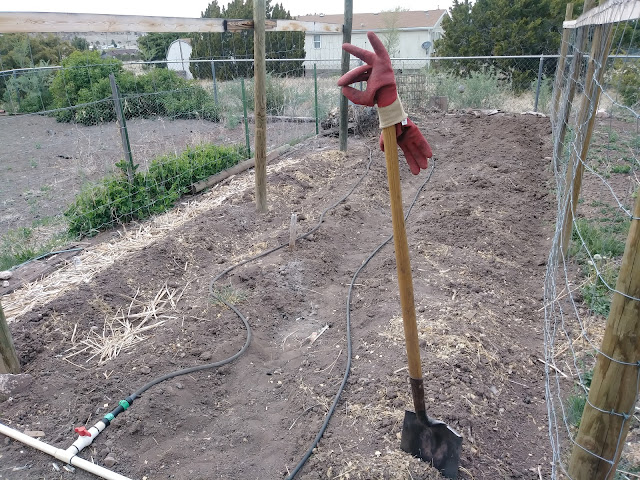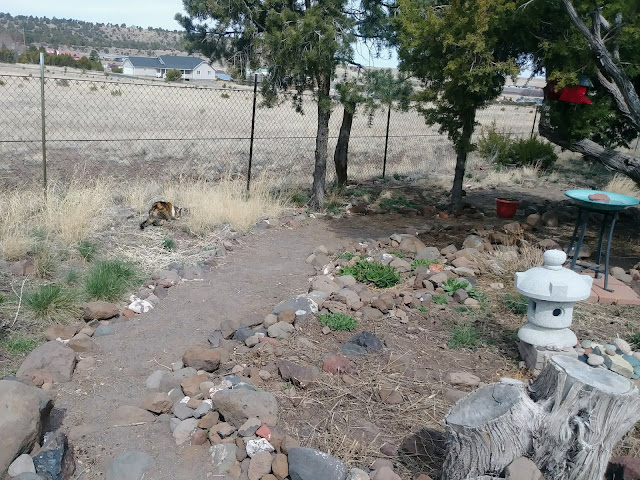 |
| We all want to be remembered. |
A few weeks ago I attended at a local park a tree walk led by a man knowledgeable about trees. Tom was uppermost in my mind during the walk as his life work had been all about plant life. With an undergraduate degree in botany, a master's degree in native grasses, a Phd in forestry, and years of tree research and first-hand care of trees and gardens, Tom was a fount of scientific knowledge. He would be pointing out plants on this walk, I thought, telling me details of the native flora, enjoying the clear, beautiful fall day, yellow gingko leaves and red maple leaves unbelievably incandescent in the morning sunlight.But Tom is gone, and every day I am reminded of the loss. After the walk, I lingered to explore one of the trails in the park and was joined by a man about my age who had also attended the tree walk. Along the way, we met a couple of men taking photos of a log covered with what looked like to me to be tiny round balls of fungus or mold. They told us that what I thought was mold was something called "wolf's milk slime," not a mold or fungus at all. My walking companion made easy conversation; he and the other two men seemed to know quite a lot about mushrooms and other fungus-like organisms.
We continued our walk, and my newly-met companion asked me how I kept busy. I told him of my gardening and of the native plant garden I was creating as a memorial to Tom. Then I mentioned that Tom had even collected seed for this garden before he died."Wow," the man said. "That's quite a guilt-laden project, having to plant the seeds gathered by a dead husband for his own memorial."
I couldn't think then of an appropriate response, but in the following days I thought a lot of this encounter. I know now what I would have said if I had had the time to think through an answer: We all want to be remembered. Tom was facing an early unexpected death caused by a disease that wasn't even on the horizon of his health-consciousness. At 61 years of age, he was still a few years short of retirement age; he was leaving a wife who loved him, imperfectly, perhaps, but genuinely and deeply loved him. He was leaving children who hadn't yet had children of their own. I wanted him to know that he would not be forgotten. Creating a memorial garden was a work of love, of remembrance...not a burden. And a loving promise to Tom as he faced oblivion.
A little over a week later I awoke on the morning of my 64th birthday and remembered that this time four years ago we found out that Tom was probably dying. Tom had yet to receive the official prognosis of lung cancer, but we figured death was imminent. I thought of all the people who also faced the untimely deaths of loved ones these past two years as the covid-19 virus was scything through the United States and the rest of the world. Almost 800,000 people have died in the US alone, with more dying every day even as vaccines and booster shots have become available.
Unbelievably, there are people who seem not care about these deaths nor about how they contribute to those deaths in their embrace of conspiracy theories, of false ideas of freedom, and of their own monstrous self-centeredness. Seeing this lack of empathy, my own grief intensifies, often morphing into anger and at times almost despair. My faith in humanity, in our ability to face challenges and to unite in finding solutions, has been irreparably damaged. Even as I recognize in the experiences of others a reflection of my own grief, I stand naked and alone in that grief. Yet it's that nakedness, that vulnerability, that loneliness that arouses my empathy. For all those 800,000 deaths, many grieving loved ones, as I, stand vulnerable, stripped bare by their losses.
And so, on my 64th birthday, I opened the journal in which I recorded the details of my 60th birthday and embraced again the visceral grief of that day, a day in which I abandoned my plans for a celebration and went instead into the White Mountains of Arizona with Tom.
---------
November 29th, 2017 -- Wednesday
I had tentatively planned hosting a party for my 60th [birthday], but as Tom's condition worsened, I postponed it, and as the possibility of lung cancer loomed in our minds, I cancelled that plan altogether. Instead, I suggested that we take a short hike in the mountains to celebrate my birthday.
Tom woke early on [that day] and spent most of the morning making pecan pie for my birthday. The recipe in the baking textbook he bought at Powell's Bookstore in Portland, Oregon, this past August makes enough filling for two pies. We kept one and Tom walked across the cul-de-sac to give the second pie to Bill and Ewa Dent. Ewa said that pecan pie was one of Bill's favorites.
After the pies were finished baking and after Tom had given one to the Dents and placed the other in the pantry, Tom and I packed up to go into the mountains. I had chosen the Thompson Trail, which runs along the West Fork of the Black River and which is accessed from FR 116.
It was a beautiful day, sunny, clear, cool, but not cold. The mountains in that area were rather smoky. Tom thinks that the smoke might have been the result of a prescribed burn in the White Mountain Apache Reservation. We had noticed the large plume of smoke beginning its ascent yesterday on a drive back from Show Low on AZ 260.
We did not hike the entire 3+ miles of the trail. Tom didn't want to overdo it--he could tell the effect on his breathing at an altitude of over 9,000 feet, and the decreased oxygen caused by the mass in his left lung. We stopped for lunch at the second fish barrier and afterward walked just a little farther past it before turning back. I also complained of some short pains in my chest; they subsided fairly quickly. [I didn't know it then, but I was suffering from acute aortic stenosis at the time, caused by a birth defect, and 6 months later would have heart surgery to correct it.]
Since Tom began suspecting lung cancer, our conversations had focused on most immediate concerns. Tom's regret for a future he might not see guided my own conversation. How can one bring up plans for a summer garden when one's companion suspects he may not see that summer? In the past, our conversations frequently touched on future plans and aspirations. Now they didn't. Instead, we talked of the day's weather or the actions we should take to help us face Tom's possible death or--at the least--possible medical responses. I had even sent a PM on Facebook to M.D. Anderson in Houston (the hospital has a FB page) asking questions about how quickly one could get into a cancer treatment program--and whoever answers queries replied to mine. And on Monday, Tom filled out the online form to enlist as a new patient in the event that he would need cancer treatment. We wanted to be as prepared as possible to have our "boots on the ground," so to speak.
So Sunday, my 60th birthday, we decided to enjoy the day as best we could, and for the most part, we did. After our hike, we drove along a Forest Road to reach Big Lake, a very popular tourist destination in the summer. Campsites there are arranged months in advance and quickly fill up. This time of year the campgrounds are closed because snow usually covers the ground. But this year the fall has been unseasonably warm. We noticed just a few patches of ice in some shady parts of the river and the Thompson Trail. Otherwise, the ground was clear, very dry, and crunchy.
While walking around one of the campsites near Big Lake, Tom and I noticed rectangular brown packages, about 4 inches long and an inch or so wide, stapled to several trees, only to Douglas Fir, I think. Tom reached up to examine one and discovered they were plastic blister packs, a round circle in the middle of each rectangle holding something yellow in color. Tom said that the packs held material that were infused with pheromones that are digusting to a beetle to which the trees were susceptible. The pheromones repel the beetles. The Forest Service, he said, places these in high-demand places.
As Tom was describing this to me, I was thinking of all the knowledge Tom has about trees and grasses and nature that he has shared with me over the years. This is one thing I would lose, losing Tom--this instant access to such knowledge. Many a time, while writing a poem or a letter I would have some questions that would need answering--some detail of a grass or a tree--that I would need to give that poem or letter the specificity I wanted. And Tom would have the answer or suggestion as to where to find the answer.
Leaving Big Lake, I suggested that we drive back home down Water Canyon Road, a gravel road that winds over the tops of the mountains and then twists and turns down steep cliffs to Round Valley below. As soon as we turned onto the road from the black-topped AZ 261, we saw driving slowly toward us an ATV with two men dressed in camouflage. As we drove closer, we saw that they were gazing intently up at the top of a ridge near the road. I looked up, too, and then pointed out to Tom the focus of the hunters' interest--two elk cows. Tom stopped the truck for a few seconds before continuing on our drive.
At one point, I noticed another Forest Road that veered left over the open grassland on the tops of these cinder cones that dot the landscape. "I wonder where that road goes," I mused. Tom immediately turned left onto the road, and we bumped across the open, grassy landscape. "I bet it meets up again with AZ 261," I said. (It did.)
As we drove through the golden grasses lit by an afternoon sun, I thought that this would be heaven--to be in a truck with Tom's hands on the steering wheel, listening and responding to Tom's passing comments on the landscape or on some topic the landscape and animal and plant life conjured. We could drive on and on together, I thought, one sunny day following another, looking out the open windows of a Ford Ranger, driving through eternity.
-----------



.jpg)
.jpg)





























